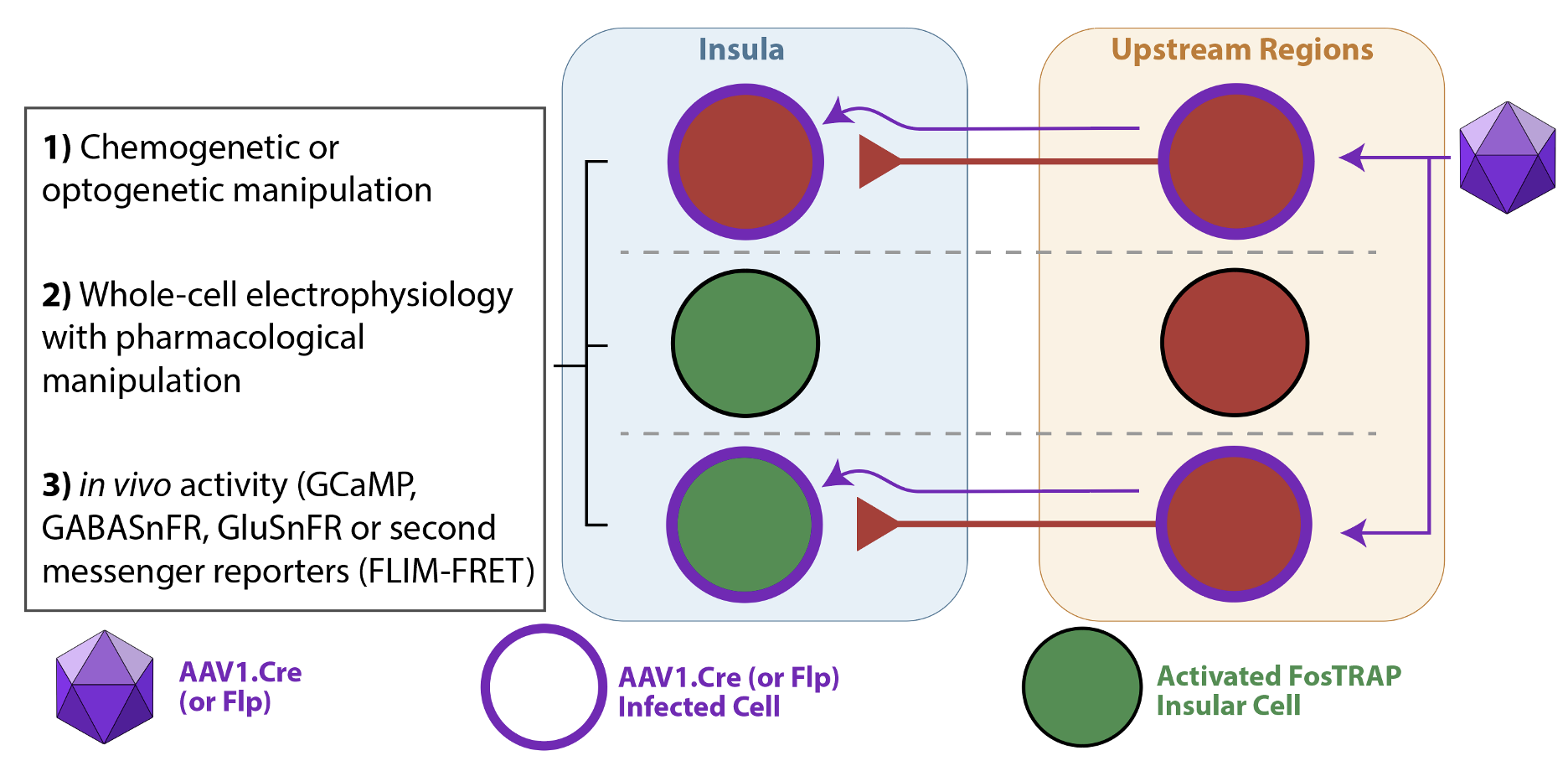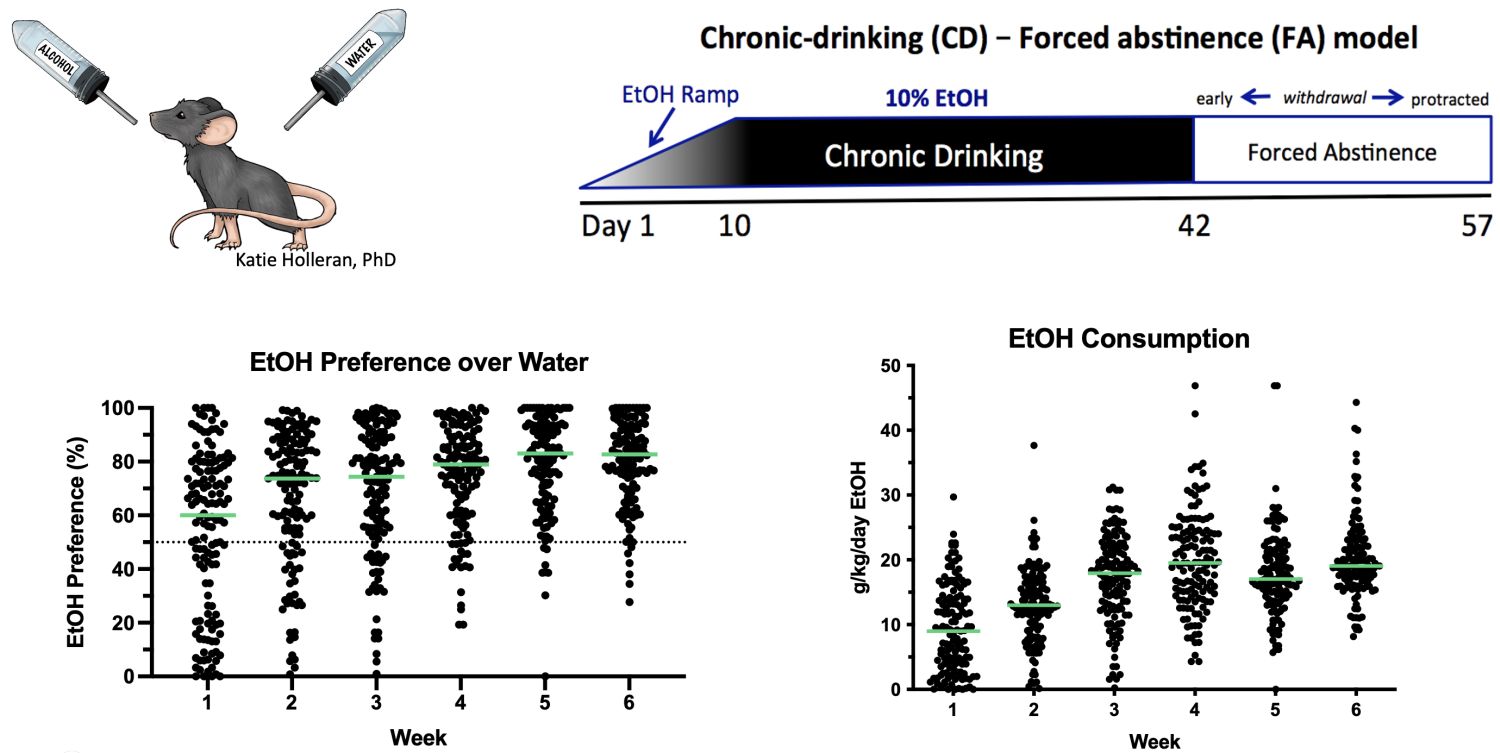- Examining the impact of stress on subsequent drinking behavior and emotional regulation
- Examining in vivo neuronal activity in the insular cortex at various timepoints before, during, and after stress and chronic alcohol drinking
- Mapping upstream control networks that functionally influence insular activity. We are currently studying inputs from basolateral amygdala and primary somatosensory cortex.

Currently Funded Projects
NIH NIAAA K99/R00

Negative affective disturbances, including stress, anxiety, and depression, are characteristic of alcohol abstinence, and a leading cause of relapse. A greater understanding of the complex neural circuitry regulating the disease state will lead to better diagnostic tools and treatment options for abstinence-induced negative affect. This project will investigate the functional state of the insular cortex, which has been implicated in alcohol use disorders and negative affect, and two upstream regulatory inputs, the thalamus and somatosensory cortex, and dysfunction in this circuitry brought about by alcohol abstinence.
Whitehall Foundation Research Grant
Stress is a regular part of our lives, yet the fundamental neurocircuitry recruited while experiencing this distinct behavioral state is unclear. Genetic and circuit-based strategies are on a converging path, with new advanced techniques now conducive for isolating circuit-specific genetic targets and monitoring real-time circuit activity. Identifying distinct stress circuit biomarkers has the potential to facilitate early detection and intervention of stress-related disorders. This project will provide unparalleled insight into fundamental neurocircuitry engaged by stress. With innovative strategies like whole brain circuit mapping with light sheet microscopy, dual color fiber photometry, optogenetics, and transcriptomics this project will isolate, characterize, and manipulate circuit and genetic signatures of stress within a BLA->insula->BNST circuit.

Errett Fisher Foundation
Daryl and Marguerite Discovery Award in Biomedical Research

Progress towards optimizing diagnosis, prevention, and prognosis of stress-related disorders has been limited. To address this, we need to identify measurable biomarkers that can predict stress-related disorders before they manifest. Indeed, previous success in pre-disease diagnoses and risk assessment with conditions like diabetes and heart disease provides a hopeful precedent. However, mental health conditions involve complex overlapping dysfunctional patterns that complicate pinpointing cause and effect. Circuits are the basic functional units that encode behavior. Delineating the complex dysfunctional circuitry of affective disorders begins with understanding the basal stress response circuitry. This project uses a novel preclinical genetic knock-in mouse model, FosTRAP2, to “tag” and gain genetic access to stress-activated neuronal ensembles in the insula and manipulate these neurons using innovative chemogenetic strategies.
Brain and Behavior Research Foundation NARSAD Young Investigator Award
A strikingly strong correlation exists between stress and depression and anxiety, of which close to 50 million adults in the United States are diagnosed, but only 40% are successfully treated. There is an increasing need for better diagnostic tools, and alternative treatment options. While many studies focus on affective disorders once they emerge, very little is known about brain circuit activity during a stressful experience. This project uses sophisticated whole brain clearing and high-resolution light sheet microscopy to image the entire intact brain and quantify which brain networks regulate stress response. Further, genetic/viral strategies will be used to isolate, genetically sequence, and circuit map stress ensembles in the insular cortex and BNST, two brain regions emerging as central integrators of the stress response circuitry. This research will provide foundational insight into, and possibly help predict, the development of affective disorders.



